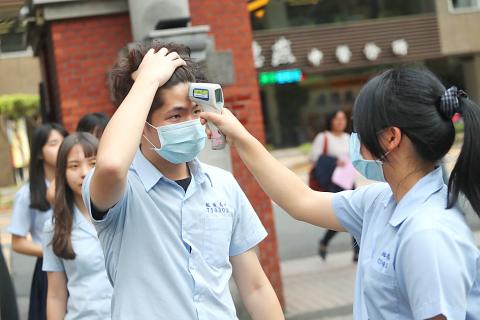The Ministry of Education is distributing 6.45 million masks to schools from kindergarten to 12th grade (K-12), as well as after-school institutions as part of government efforts to contain the COVID-19 outbreak as the spring semester starts today.
As K-12 schools reopen after a two-week delay due to the outbreak, the ministry said that it is also providing them with 25,000 infrared thermometers and 84,000 liters of alcohol-based sanitizers.
Of the 6.45 million masks, 500,000 have been earmarked for private kindergartens, 770,000 for after-school tutoring institutions and childcare centers, and 5.18 million for K-12 schools, Department of Planning head Huang Wen-ling (黃雯玲) said on Sunday.

Photo: CNA
The masks are for “backup” purposes and should be used only in emergency situations, such as if a child or teacher develops a fever, cough, sore throat or respiratory symptoms, Huang added.
The thermometers are being distributed in two batches, with 12,500 units having been delivered as of yesterday and 12,500 more to be delivered by Monday next week, she said.
The distribution of 40,000 liters of alcohol-based sanitizers to private kindergartens and other institutions started on Feb. 10 and would be completed within three weeks, while another 44,000 liters are being distributed to schools over a three-week period that started on Monday last week, Huang said.
Most of the nation’s universities are to begin their spring semester on Monday next week after an extended break due to the coronavirus outbreak.

‘DENIAL DEFENSE’: The US would increase its military presence with uncrewed ships, and submarines, while boosting defense in the Indo-Pacific, a Pete Hegseth memo said The US is reorienting its military strategy to focus primarily on deterring a potential Chinese invasion of Taiwan, a memo signed by US Secretary of Defense Pete Hegseth showed. The memo also called on Taiwan to increase its defense spending. The document, known as the “Interim National Defense Strategic Guidance,” was distributed this month and detailed the national defense plans of US President Donald Trump’s administration, an article in the Washington Post said on Saturday. It outlines how the US can prepare for a potential war with China and defend itself from threats in the “near abroad,” including Greenland and the Panama

A wild live dugong was found in Taiwan for the first time in 88 years, after it was accidentally caught by a fisher’s net on Tuesday in Yilan County’s Fenniaolin (粉鳥林). This is the first sighting of the species in Taiwan since 1937, having already been considered “extinct” in the country and considered as “vulnerable” by the International Union for Conservation of Nature. A fisher surnamed Chen (陳) went to Fenniaolin to collect the fish in his netting, but instead caught a 3m long, 500kg dugong. The fisher released the animal back into the wild, not realizing it was an endangered species at

The High Prosecutors’ Office yesterday withdrew an appeal against the acquittal of a former bank manager 22 years after his death, marking Taiwan’s first instance of prosecutors rendering posthumous justice to a wrongfully convicted defendant. Chu Ching-en (諸慶恩) — formerly a manager at the Taipei branch of BNP Paribas — was in 1999 accused by Weng Mao-chung (翁茂鍾), then-president of Chia Her Industrial Co, of forging a request for a fixed deposit of US$10 million by I-Hwa Industrial Co, a subsidiary of Chia Her, which was used as collateral. Chu was ruled not guilty in the first trial, but was found guilty

DEADLOCK: As the commission is unable to forum a quorum to review license renewal applications, the channel operators are not at fault and can air past their license date The National Communications Commission (NCC) yesterday said that the Public Television Service (PTS) and 36 other television and radio broadcasters could continue airing, despite the commission’s inability to meet a quorum to review their license renewal applications. The licenses of PTS and the other channels are set to expire between this month and June. The National Communications Commission Organization Act (國家通訊傳播委員會組織法) stipulates that the commission must meet the mandated quorum of four to hold a valid meeting. The seven-member commission currently has only three commissioners. “We have informed the channel operators of the progress we have made in reviewing their license renewal applications, and